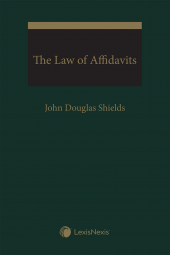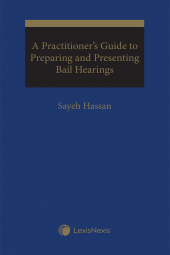The Law of Affidavits
One Year Subscription Only Terms
Subscribers receive the product(s) listed on the Order Form and any Updates made available during the annual subscription period. Shipping and handling fees are not included in the annual price.
Subscribers are advised of the number of Updates that were made to the particular publication the prior year. The number of Updates may vary due to developments in the law and other publishing issues, but subscribers may use this as a rough estimate of future shipments. Subscribers may call Customer Support at 800-833-9844 for additional information.
Subscribers may cancel this subscription by: calling Customer Support at 800-833-9844; emailing customer.support@lexisnexis.com; or returning the invoice marked 'CANCEL'.
If subscribers cancel within 30 days after the product is ordered or received and return the product at their expense, then they will receive a full credit of the price for the annual subscription.
If subscribers cancel between 31 and 60 days after the invoice date and return the product at their expense, then they will receive a 5/6th credit of the price for the annual subscription. No credit will be given for cancellations more than 60 days after the invoice date. To receive any credit, subscriber must return all product(s) shipped during the year at their expense within the applicable cancellation period listed above.
Détails des produits
"The Law of Affidavits is the first and only text dedicated to evidence and the drafting of affidavits. Shields uses his experience as a long-time litigator to review the creative process of drafting affidavits based on British Columbia’s rules of procedure and evidentiary laws. The expectation is that the rules regarding affidavits are similar in all Canadian jurisdictions...Librarians, novice lawyers, and more practiced lawyers will appreciate this text as a must-have for any practice dealing with the preparation of affidavits."
Reviewed by Laura Lemmens, Retired Librarian
Edmonton, Alberta
See Review in 2023 Canadian Law Library Review 48:3 (pages 23-24)
As author and veteran litigator, John Douglas Shields maintains, “Affidavits are a craft, requiring insight, experience and patience, peppered with limited artistic licence. Cases can be won on artful and careful drafting or lost on the shoals of an affidavit that should never have left the printer.”
To help fellow practitioners develop winning affidavits – and also “properly and ethically decimate the opponent’s case” – Shields has drafted this new volume, The Law of Affidavits, based on his decades of experience as a litigator and his meticulous research that included reviewing over a century of jurisprudence and approximately 5,000 cases.
A Comprehensive Reference
Unique in the litigation resource landscape, The Law of Affidavits is the first book in Canada to focus exclusively on affidavits, which have become the most prevalent and important form of evidence in litigation.
This detailed reference book sets out best practices when it comes to both drafting and objecting to affidavits, backed up by the applicable case law and extensive technical guidance. Relying on the Rules of Court for British Columbia – which are similar to rules governing affidavits across Canada – Shields provides lawyers, judges and masters with access to the law and jurisprudence related to these critical documents, with authorities cited from Canada.
The Law of Affidavits is a comprehensive volume, examining affidavits from a variety of perspectives, including as part of criminal law and family law matters, as well as affidavits from lawyers and legal staff. By addressing everything from drafting rules and techniques, to common pitfalls, to tried-and-true methods for critically examining and challenging affidavits prepared by opposing counsel, this book sets out the law and ethical and professional obligations for any lawyer preparing, or defending, an application or Summary Trial, or in dealing with affidavits and statutory declarations.
Indispensable for Litigators
Anyone involved in the practice of law will benefit from adding The Law of Affidavits to their bookshelf or desk, including:
- Lawyers, who will refer to it for guidance when drafting affidavits in a variety of contexts (i.e., civil, family, criminal matters) and assessing those prepared by opposing counsel
- Litigators and solicitors, who deal with affidavits on a regular basis
- Judges, who can rely on it when ruling on issues of admissibility, especially given the growing prevalence of affidavit evidence in court proceedings
- Law and articling students, who can use it to learn about a key area of legal drafting
- Law libraries, who can include it in their legal research and writing collections
Table des matières
Chapter 1: Introduction
Chapter 2: Formalities
Chapter 3: Obligations of Counsel
Chapter 4: Withdrawal or Amendment of an Affidavit
Chapter 5: Admissibility – Generally
Chapter 6: Admissibility – Hearsay
Chapter 7: Examples of Inadmissible Affidavit Language
Chapter 8: The Internet
Chapter 9: The Role of the Court
Chapter 10: Don’t Try This
Chapter 11: Affidavits from Lawyers
Chapter 12: Affidavits from Legal Staff
Chapter 13: Language and Translations
Chapter 14: Objecting to, Striking Out, and Cross-Examination
Chapter 15: Family Law Affidavits
Chapter 16: Criminal Law Considerations
Chapter 17: Exhibits
Chapter 18: Self-Represented Litigants and Affidavits
Chapter 19: Costs Consequences of Improper Affidavits
Chapter 20: Practical Resources
Chapter 21: Conclusion
Table of Cases
Index
 Lexis Nexis
Lexis Nexis 


